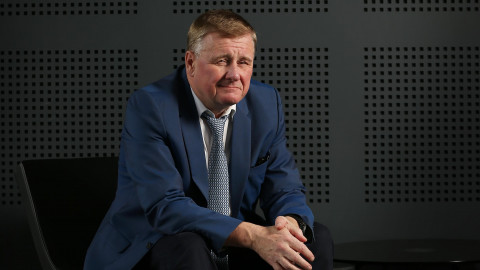
Forms of autism could be “completely prevented” by an “experimental workshop for the world” setting up in Perth’s southern suburbs.
Professor Jeremy Nicholson, new head of the Australian National Phenome Centre at Fiona Stanley Hospital’s Harry Perkins Institute of Medical Research, said the revolutionary work could stop some children becoming autistic.
A phenome is a snapshot of a person’s unique biology that results from interactions between environmental factors such as diet, lifestyle, pollutants and their genes.
Professor Nicholson will study these biological markers in a bid to better understand the causes of diseases and conditions such as cancers, obesity, type 2 diabetes, dementia and autism, and develop precision medicine to prevent and treat them.
A pioneer in systems medicine and metabolic phenotyping, Professor Nicholson — who left his post at Imperial College London to lead the team in Perth — is especially passionate about research into autism, which he calls a “silently growing monster”.
“(Autism) is the most expensive disease in the Western world, it costs the UK £32 billion a year because it’s a lifelong disease. And it’s $300 billion a year in the US,” the world-leading researcher said. “What we’re trying to do is get the earliest biomarkers that indicate a child is going to shift on to an autistic pathway ... the most important type of autism is the so-called regressive autism which starts to occur typically six, seven months into life, or maybe a year, where the kids have developed normally and suddenly stop.
“That is an environmental trigger. There is a type of autism which is present from birth and that is rare. The one that’s going up is the one where the kids develop and they go backwards, and it’s probably a microbial or possibly even drug connection.
“Pre-term birth babies are four times more likely to get autism than full-term birth babies. Of course, pre-term birth babies are given massive amounts of antibiotic, so their gut microbes don’t develop properly.”
Professor Nicholson said if those autism-causing biomarkers could be identified then an intervention could be developed. “I think it is possible that some sorts of autism could be completely prevented,” he said.
Professor Nicholson said this world-leading lab, to be fully up and running by mid-next year, would be capable of mapping the biological profiles of every West Australian, using technology called mass spectrometry. This ANPC, a joint initiative between Murdoch University, South Metropolitan Health Service and the Harry Perkins Institute, will house the biggest collection of mass spectrometers in the southern hemisphere.
“I would like to phenotype and genotype everybody in WA, now that is going to cost you $1 billion or $2 billion, but seriously it will save you $50 billion or $100 billion over 20, 30, 40 years,” he said. “And the important thing is that if you can do that when somebody gets sick you already know a hell of a lot about their biology and that means precision medicine can be very, very efficient.”
Health Minister Roger Cook said what this hub could achieve could not be underestimated.
“This is just going to revolutionise the way we approach the whole concept of health care,” he said.
from https://www.perthnow.com.au/news/public…